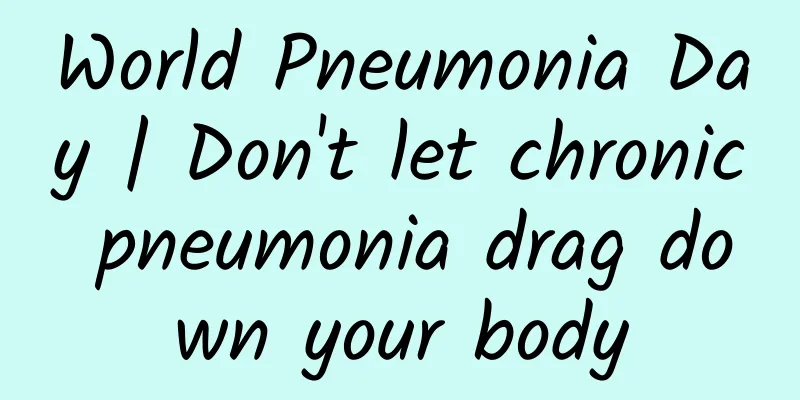World Pneumonia Day | Don't let chronic pneumonia drag down your body

|
Winter is the peak season for pneumonia, which can be caused by a variety of factors, including fungi, bacteria, viruses, and mycoplasma. Children, people over 65 years old, and other people with weakened immune systems are more likely to get infected and develop pneumonia, so prevention of pneumonia in winter is very important. Why does the risk of pneumonia increase in winter? Winter is cold, and the temperature difference between indoors and outdoors is large. People are prone to catching cold, which leads to low immunity and makes them susceptible to infection by pathogenic microorganisms such as bacteria and viruses. At the same time, because the outdoor temperature is low, people stay indoors for a longer time, making them more likely to come into close contact with bacteria, fungi or viruses. Develop good hygiene habits. Bacteria and viruses that cause pneumonia are usually transmitted through contact. Washing hands frequently is an effective way to reduce the spread of pathogenic microorganisms. Especially in crowded places such as schools and hospitals, wash your hands frequently. Be sure to use hand sanitizer or soap that can kill bacteria and viruses to thoroughly clean your hands. Also, develop the habit of not touching your eyes, nose or mouth with your hands. Wear a mask when going out to crowded places. Do not reuse masks. Wash and dry your clothes in time for disinfection. Keep warm and treat colds in time. The weather is cold in winter. If you don't keep warm, you will easily catch a cold. If you don't get enough rest or your condition is serious and you don't get timely treatment, you may develop pneumonia. Pneumonia starts with symptoms of upper respiratory tract infection, mainly nasal congestion, runny nose, sore throat, and cough. When the cough worsens, the upper respiratory tract infection disappears, and the sputum increases, and yellow or rust-colored sputum appears, you should be alert to pneumonia. Therefore, we should pay attention to adding clothes in time in winter, and people with colds should also pay attention to rest in time. Patients with severe colds should be treated in time to prevent the disease from developing and leading to pneumonia. Quit smoking in time to protect yourself and your family. Smoking can cause bacterial pneumonia by interfering with the body's immune and inflammatory functions. For people who smoke at least one cigarette a day or have a smoking history of at least one year, the incidence of pneumonia will be twice that of non-smokers. For people who smoke more than 20 cigarettes a day, the incidence of pneumonia will be three times that of non-smokers [1]. Quitting smoking in time can not only protect yourself, but also protect others. The harm of second-hand smoke and third-hand smoke is also very serious. Cigarette smoke contains a variety of cilia toxic substances such as cyanide, formaldehyde, acetaldehyde, and acrolein. Cigarette toxic substances can damage the cilia tissue of the respiratory system of infants and young children, affecting the protective function of the cilia and the clearance of foreign bodies from the outside world, making infants and young children susceptible to infection by pathogenic microorganisms, respiratory diseases and even pneumonia [2]. Vaccination is a good way to prevent illness. Elderly people, pregnant women, children, people with chronic health problems or compromised immune systems can choose to get vaccinated. Flu and pneumonia vaccines can effectively prevent influenza, reduce the incidence of pneumococcal pneumonia and invasive pneumococcal disease, and can reduce symptoms even if the disease occurs after antibodies are produced by vaccination. Beware of "humidifier pneumonia". In winter, many families use air conditioning, heating and other facilities to keep warm. Because they are afraid of indoor dryness, many people choose to use humidifiers to increase the indoor humidity. At this time, we must be wary of "humidifier pneumonia". If the humidifier is used for a long time, the indoor environment will be too humid, which is easy to breed bacteria and mold. At the same time, if the humidifier itself is not cleaned in time, it will also breed bacteria, forming "bacteria-containing water mist", which can easily enter the human body through breathing and cause adverse effects. Therefore, the humidifier should be cleaned in time, and the indoor humidity should be controlled to avoid too low or too high humidity [3]. [1] Yu Wenping. Smoking can double the risk of pneumonia. Chinese Journal of Social Medicine, 2003, 020: 48-48 [2] Li Jun. Study on the correlation between passive smoking and the incidence of pneumonia in children. Modern Distance Education of Traditional Chinese Medicine, 2015, 3 [3] Wang Xuemei. Beware of "humidifier pneumonia" in winter. Chinese Health Food, 2016, 1 |
Recommend
A simple action can measure the risk of future death! Those who can't do it in 10 seconds should be careful
In the "National Physical Fitness Measuremen...
What can whipping cream do? What is the difference between imported cream and animal cream?
Compared with vegetable cream, animal cream conta...
What else do we eat during the Mid-Autumn Festival besides mooncakes? How to make mooncake skin soft and crispy
The Mid-Autumn Festival is one of the four major ...
What to do if your uterus shrinks after menopause
After menopause, women's uterus will graduall...
Can girls eat apples during menstruation?
Apples contain many kinds of vitamins, sugars and...
Why can't mung beans make soy milk? Calories in mung bean syrup
Mung bean soup can clear away heat and detoxify. ...
Interesting Medicine Talk | Aspergillus oryzae pancreatic enzyme enteric-coated tablets (with audio)
Your browser does not support the audio tag...
What to do if hypersensitive thyroid stimulating hormone is high in pregnant women
During pregnancy, it is very important for the he...
How to prevent breast diseases?
Breast disease is one of the gynecological diseas...
Can people with high uric acid eat pig skin? One piece of data will help you answer all your questions
Speaking of high uric acid, many people may not b...
Is it painful to have an artificial abortion at two months?
Many couples or lovers become pregnant without do...
What should pregnant women do if they often suffer from facial allergies?
Pregnant women have relatively low immunity durin...
Ointment for treating vulvar leukoplakia
Vulvar leukoplakia is a very common disease among...
What to do if hemorrhoids prolapse during childbirth
Pregnant women with hemorrhoids are prone to hemo...
Frequent urination, painful urination, blood, what is going on?
Some women will inadvertently find themselves exp...









